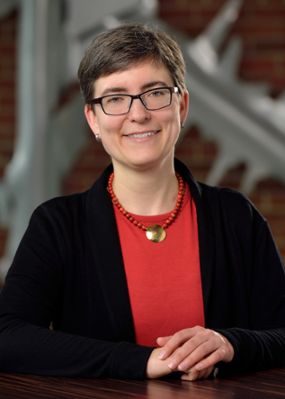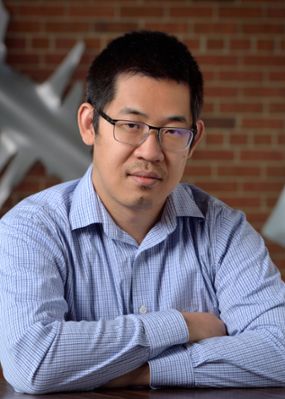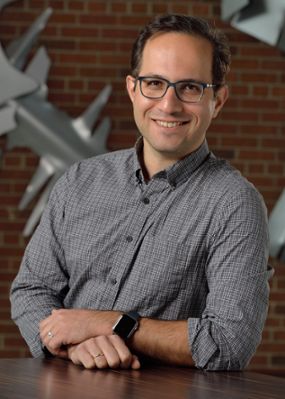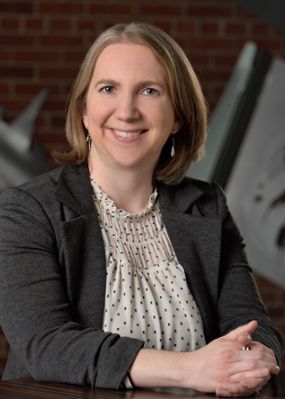Five NatSci faculty members honored with NSF Early CAREER Awards
Five Michigan State University (MSU) researchers from the College of Natural Science (NatSci)—Julia Ganz, Huan Lei, Mohammad Maghrebi, Elizabeth Munch and Johannes Pollanen—have received NSF Early CAREER Faculty Awards. Their cutting-edge research pushes the limits of science, while their devotion to education is preparing the next generation of scientists to propel their field even further. Collectively, over the next five years (2022-2027) they will receive more than $3.7 million in National Science Foundation (NSF) funding.
The Early CAREER Faculty Award is one of NSF’s most prestigious grants and is given to faculty members who demonstrate leadership in research and education and have a passion for integrating the two.
“The award of five 2022 NSF CAREER awards to faculty in NatSci is a testament to the outstanding achievements and potential of young faculty across the college and continues the legacy of success in this competition,” said Phillip M. Duxbury, NatSci dean. “Congratulations to these exceptional faculty and to the units where they carry out their innovative research, teaching, and service programs.”

Julia Ganz, assistant professor in the Department of Integrative Biology (IBIO), studies the genetic role of neuronal development in the enteric nervous system (ENS), the system of neurons that regulates all gut functions. Although it is the largest part of the peripheral nervous system, very little is known about the generation of the different ENS cell types during development. To research this in vertebrates, Ganz and her team will investigate the embryos of live zebrafish. With new knowledge from the study, Ganz hopes to contribute to developing therapeutic approaches for ENS diseases.
“I am thrilled to receive this $1.72 million NSF CAREER award because it provides substantial support and freedom for my research program that will pave the way for a new research direction in my lab,” Ganz said. “The specific question we aim to answer with this grant is whether the distinct gut parts use different genetic signals or if the factors used during development are the same along the whole length of the gut.”
The grant will support furthering both Ganz’s research and educational goals. In addition to an interactive booth for the MSU Science Festival, Ganz will develop an undergraduate course on CRISPR genome editing. Students who join her research program will also have opportunities for professional development.
Before joining MSU in 2016, Ganz was a postdoctoral research associate at the University of Oregon. She received her Ph.D. in biology from Dresden University of Technology.

Huan Lei, assistant professor in the Department of Computational Mathematics, Science and Engineering (CMSE) and the Department of Statistics and Probability, studies the connection between scientific machine learning and computational mathematics. More specifically, Lei is interested in developing high-fidelity computational models for multiscale multiphysics systems.
Lei’s $413,516 CAREER Award will support the development of a machine learning–based model of complex fluids with molecular fidelity—a well-known and challenging problem in the fields of applied mathematics and fluid physics. To address this issue, Lei and his team will create a new learning framework based on the theories of model reduction and stochastic differential equations. In addition to its broad engineering applications, the developed method will enable scientists to probe some fundamental scientific questions in the nanoscale fluid physics field.
In addition to his research goal, Lei will develop an education plan that seeks to enhance training for the next generation of STEM workers by integrating data science and computational mathematics education. Despite the fast growth and progress of machine learning in computational mathematics and natural sciences, current education and training initiatives in these areas are largely based on conventional perspectives. To fill the gap, Lei will develop a new Capstone course on scientific machine learning geared toward STEM students to extend their understanding beyond conventional offerings. Ultimately, he hopes to develop a sustainable pipeline for the broad engagement of mathematics and natural science students and retain a diverse student population in this exciting research direction.
“This NSF CAREER award means a lot to me,” Lei said. “As an applied mathematician, my long-term research goal is to develop computational tools to advance our scientific understanding of complex multiscale physical systems. I envision this project as a foundation for my effort toward the predictive understanding and control of these systems.”
Lei received his Ph.D. in applied mathematics from Brown University. Prior to joining the MSU faculty in 2019, he worked as a research scientist and postdoctoral research associate at the Pacific Northwest National Laboratory.

Mohammad Maghrebi, assistant professor in the Department of Physics and Astronomy, studies condensed matter physics. With a CAREER Award of just under $600,000, Maghrebi and his team will focus on highly excited quantum systems involving many interacting particles. This research is particularly relevant in the new era of non-equilibrium quantum systems. Studying these systems will shed light on how the delicate quantum correlations evolve or even survive in the dynamics. This research has far-reaching applications for the leading platforms of quantum computation and could lead to a new paradigm for quantum phases of matter.
In addition to mentoring graduate and undergraduate students, Maghrebi plans to use the award funding toward public outreach. Using art to communicate physics, Maghrebi is taking his workshop series and website to another level. The “Schrödinger’s Cat in Town!” workshop brings together physicists, artists and the public at MSU’s Broad Museum Art Lab, while the online project “Bohring Art” aims to present the modern fact of quantum physics to the next generation of quantum scientists and engineers.
“The NSF CAREER Award is viewed as the highest achievement by an early-career faculty member,” Maghrebi said. “This award is an affirmation from the broader scientific community that you are doing well and are on a robust path in your career. It’s quite satisfying, and at the same time humbling, to feel that you are contributing to the bigger scientific community.”
Maghrebi received his Ph.D. from the Massachusetts Institute of Technology where he focused on the intersection of quantum and statistical physics. Before he joined MSU’s Theoretical Condensed Matter Physics group in 2017, he worked as a postdoctoral researcher at the Joint Quantum Institute at the University of Maryland.

Elizabeth Munch, assistant professor in CMSE and the Department of Mathematics, is interested in the intersection of pure mathematics and data analysis. By taking topological graph-based representations of data, she can develop the theory needed to apply new tools to real data. Her goal is to create an interface between machine learning methods and graphical signatures, representations of the structure of the data using a graph.
“I am so proud of the diverse, interdisciplinary research group that I have built here at MSU,” Munch said. “It is truly an honor to receive the NSF Career award. In grad school, as a non-traditional student, I never thought that being a professor was something I could do. To not only achieve that dream, but to also receive such an honor, is beyond belief.”
Munch will use her $507,462 grant toward a new graduate-level graphical signatures course, an expanded seminar program and workshops on Topological Data Analysis (TDA). These programs will facilitate networking in the field, bringing new speakers to MSU, and will encourage interdisciplinary collaborations between junior researchers and domain scientists.
Munch received her Ph.D. from Duke University in 2013. Prior to joining the faculty of MSU in 2017, she was an assistant professor in the Department of Mathematics and Statistics at the University at Albany - SUNY, and a postdoctoral fellow at the Institute for Mathematics and its Applications at the University of Minnesota.

Johannes Pollanen, assistant professor and Jerry Cowen Endowed Chair of Experimental Physics, Department of Physics and Astronomy, will use his CAREER grant to expand the fundamental knowledge of “quantum acoustic” systems and how they might realize new quantum technologies. Pollanen and his lab have figured out how to design, build and control hybrid systems based on superconducting quantum bits (qubits) and high-frequency surface acoustic waves.
“This NSF CAREER award is the culmination of the truly wonderful experimental work by the folks in my research group,” Pollanen said. “MSU graduate students, postdocs and undergrad researchers are ultimately the drivers of this type of innovation and discovery. This award is a testament to their terrific creativity and hard work.”
Pollanen’s $500,000 CAREER award will help fund the education and research of multiple graduate students in his Laboratory for Hybrid Quantum Systems and their efforts to develop new hybrid quantum systems. They hope to make new discoveries related to the coupling of single quantum excitations in these systems, which can lead to technological advances in frequency conversion and memories for future quantum computers.
Pollanen is also working to transform the junior-level undergraduate Quantum Mechanics course into an interactive “spins first” format, adding three new quantum experiments to the Advanced Undergraduate Lab Course and creating a new Quantum Computing graduate course. He is also personally involved in the diversification of quantum information science researchers at MSU by helping to recruit students from underrepresented backgrounds to join in the cutting-edge quantum computing research going on at the university.
After receiving his Ph.D. in physics in 2012 from Northwestern University, Pollanen became a postdoctoral scholar at the Institute for Quantum Information and Matter at the California Institute of Technology. From there, he joined MSU and established the Laboratory for Hybrid Quantum Systems and is currently an associate director of the MSU Center for Quantum Computing, Science and Engineering, or MSU-Q.
Banner: Five Michigan State University researchers from the College of Natural Science Pictured above (L to R)—Huan Lei, Elizabeth Munch, Mohammad Maghrebi, Julia Ganz and Johannes Pollanen—have received 2022 NSF Early CAREER Faculty Awards. Credit: Harley J. Seeley